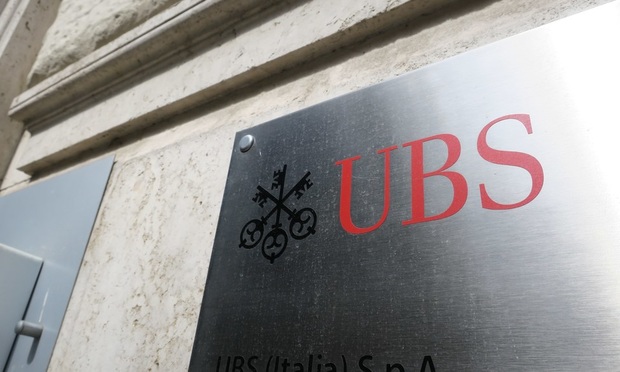UBS, Pointing to SCOTUS Ruling, Asks Court to Block Class Action
“The allegations in this case are false, and the Supreme Court decision earlier this year makes clear that this case does not belong in court at all,” a UBS spokesman said.
October 11, 2018 at 05:52 PM
4 minute read
 UBS bank. Credit: Mike Scarcella / NLJ
UBS bank. Credit: Mike Scarcella / NLJ
When UBS tried this year to head off a class action over compensation practices, the investment bank invoked the contracts that employees signed waiving rights to band together to pursue cases in court.
In March, U.S. District Judge Matthew Kennelly in Chicago allowed the case to proceed against UBS in court, citing a prior decision by the U.S. Court of Appeals for the Seventh Circuit. The appeals court said class action waivers were invalid under federal labor law.
That was before the U.S. Supreme Court stepped in.
On Wednesday, seizing on the Supreme Court's decision last term that said employment agreements can restrict class actions, UBS asked the Seventh Circuit to overrule Kennelly, block the class action and push the dispute to arbitration.
UBS, represented by Gibson, Dunn & Crutcher partner Eugene Scalia, argued the case's “tenure in the federal courts should be brought to [a] prompt conclusion” after the Supreme Court's decision in Epic Systems v. Lewis. In that 5-4 decision, the high court found that class action waivers are enforceable, overturning an earlier Seventh Circuit ruling.
“Post-Epic Systems, the district court's premise—that the waivers were invalid, and the parties could thus maintain class claims—is no longer correct,” Scalia said in his opening brief.
“To the extent that plaintiffs seek affirmance of the district court's decision on alternative grounds, their arguments may be dispensed with quickly—as plaintiffs evidently recognized when they initially told the lower court that if Lewis were reversed, this case belonged in arbitration,” he added.
Scalia declined to comment on the case Thursday.
Lawyers for UBS said the “plaintiffs have spent nearly two years in court seeking to avoid doing what they unequivocally agreed to do: arbitrate their claims against their former employer. In the process, they have made 'a mockery of arbitration's promise to expedite and cut the costs of resolving disputes.'”
The plaintiffs—Shannon Zoller, a former UBS investment banker, and Alexander Beigelman, a former information technologies executive at the bank, who were each terminated as part of what UBS called “reductions in force”—are represented by Linda Friedman of Stowell & Friedman, a Chicago-based boutique that specializes in employment litigation. Friedman could not be reached for comment Thursday.
Zoller and Beigelman based their claims, in part, on being denied discretionary bonuses in 2012 and 2014, respectively. Before bringing his case with Zoller in federal court, Beigelman initiated an arbitration proceeding in 2015 before the Financial Industry Regulatory Authority, where a panel denied his claims for severance and his 2014 bonus but ordered UBS to pay out some of his deferred compensation awards, according to court papers.
“The allegations in this case are false, and the Supreme Court decision earlier this year makes clear that this case does not belong in court at all,” a UBS spokesman said.
Beigelman also accused UBS of age discrimination and sought to represent former employees older than 40 who were terminated in reductions of force, denied compensation and required to sign a release of discrimination claims to receive a portion of their incentive and deferred compensation. Scalia, in his filing Wednesday, wrote that Beigelman pleaded “no supporting facts” in his allegation of age discrimination.
Zoller and Beigelman alleged UBS engages in a scheme of promising employees yearly bonuses but firing many of them before any bonus accrues. And in severance agreements, the plaintiffs alleged, UBS effectively “holds hostage” employees' deferred compensation unless they waive claims to incentive-based pay, along with any future discrimination claims against the bank.
Faced with “this Hobson's choice, many employees—exactly as UBS intended—purport to release their compensation and discrimination claims in order to recover at least a portion of the money they are owed,” Friedman wrote in a 2017 court filing.
Read more:
Veteran SCOTUS Advocate Allyson Ho Jumps to Gibson Dunn From Morgan Lewis
Litigator of the Week: Eugene Scalia Scores Again
Justices, Divided, Say Employment Contracts Banning Class Actions Are Lawful
This content has been archived. It is available through our partners, LexisNexis® and Bloomberg Law.
To view this content, please continue to their sites.
Not a Lexis Subscriber?
Subscribe Now
Not a Bloomberg Law Subscriber?
Subscribe Now
NOT FOR REPRINT
© 2025 ALM Global, LLC, All Rights Reserved. Request academic re-use from www.copyright.com. All other uses, submit a request to [email protected]. For more information visit Asset & Logo Licensing.
You Might Like
View All
Insurance Policies Don’t Cover Home Depot's Data Breach Costs, 6th Circuit Says

'Religious Discrimination'?: 4th Circuit Revives Challenge to Employer Vaccine Mandate
2 minute read
Standing Spat: Split 2nd Circuit Lets Challenge to Pfizer Diversity Program Proceed

Fight Over Amicus-Funding Disclosure Surfaces in Google Play Appeal
Trending Stories
- 1Judge Rejects Walgreens' Contractual Dispute Against Founder's Family Member
- 2FTC Sues PepsiCo for Alleged Price Break to Big-Box Retailer, Incurs Holyoak's Wrath
- 3Greenberg Traurig Litigation Co-Chair Returning After Three Years as US Attorney
- 4DC Circuit Rejects Jan. 6 Defendants’ Claim That Pepper Spray Isn't Dangerous Weapon
- 5Quiet Retirement Meets Resounding Win: Quinn Emanuel Name Partner Kathleen Sullivan's Vimeo Victory
Who Got The Work
J. Brugh Lower of Gibbons has entered an appearance for industrial equipment supplier Devco Corporation in a pending trademark infringement lawsuit. The suit, accusing the defendant of selling knock-off Graco products, was filed Dec. 18 in New Jersey District Court by Rivkin Radler on behalf of Graco Inc. and Graco Minnesota. The case, assigned to U.S. District Judge Zahid N. Quraishi, is 3:24-cv-11294, Graco Inc. et al v. Devco Corporation.
Who Got The Work
Rebecca Maller-Stein and Kent A. Yalowitz of Arnold & Porter Kaye Scholer have entered their appearances for Hanaco Venture Capital and its executives, Lior Prosor and David Frankel, in a pending securities lawsuit. The action, filed on Dec. 24 in New York Southern District Court by Zell, Aron & Co. on behalf of Goldeneye Advisors, accuses the defendants of negligently and fraudulently managing the plaintiff's $1 million investment. The case, assigned to U.S. District Judge Vernon S. Broderick, is 1:24-cv-09918, Goldeneye Advisors, LLC v. Hanaco Venture Capital, Ltd. et al.
Who Got The Work
Attorneys from A&O Shearman has stepped in as defense counsel for Toronto-Dominion Bank and other defendants in a pending securities class action. The suit, filed Dec. 11 in New York Southern District Court by Bleichmar Fonti & Auld, accuses the defendants of concealing the bank's 'pervasive' deficiencies in regards to its compliance with the Bank Secrecy Act and the quality of its anti-money laundering controls. The case, assigned to U.S. District Judge Arun Subramanian, is 1:24-cv-09445, Gonzalez v. The Toronto-Dominion Bank et al.
Who Got The Work
Crown Castle International, a Pennsylvania company providing shared communications infrastructure, has turned to Luke D. Wolf of Gordon Rees Scully Mansukhani to fend off a pending breach-of-contract lawsuit. The court action, filed Nov. 25 in Michigan Eastern District Court by Hooper Hathaway PC on behalf of The Town Residences LLC, accuses Crown Castle of failing to transfer approximately $30,000 in utility payments from T-Mobile in breach of a roof-top lease and assignment agreement. The case, assigned to U.S. District Judge Susan K. Declercq, is 2:24-cv-13131, The Town Residences LLC v. T-Mobile US, Inc. et al.
Who Got The Work
Wilfred P. Coronato and Daniel M. Schwartz of McCarter & English have stepped in as defense counsel to Electrolux Home Products Inc. in a pending product liability lawsuit. The court action, filed Nov. 26 in New York Eastern District Court by Poulos Lopiccolo PC and Nagel Rice LLP on behalf of David Stern, alleges that the defendant's refrigerators’ drawers and shelving repeatedly break and fall apart within months after purchase. The case, assigned to U.S. District Judge Joan M. Azrack, is 2:24-cv-08204, Stern v. Electrolux Home Products, Inc.
Featured Firms
Law Offices of Gary Martin Hays & Associates, P.C.
(470) 294-1674
Law Offices of Mark E. Salomone
(857) 444-6468
Smith & Hassler
(713) 739-1250










